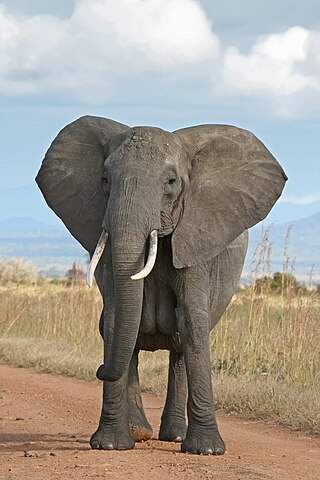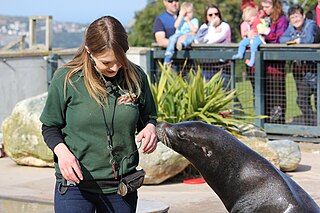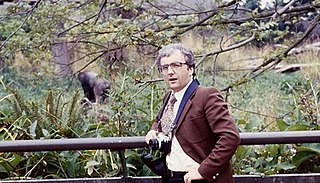Related Research Articles

Elephants are the largest living land animals. Three living species are currently recognised: the African bush elephant, the African forest elephant, and the Asian elephant. They are the only surviving members of the family Elephantidae and the order Proboscidea; extinct relatives include mammoths and mastodons. Distinctive features of elephants include a long proboscis called a trunk, tusks, large ear flaps, pillar-like legs, and tough but sensitive grey skin. The trunk is prehensile, bringing food and water to the mouth and grasping objects. Tusks, which are derived from the incisor teeth, serve both as weapons and as tools for moving objects and digging. The large ear flaps assist in maintaining a constant body temperature as well as in communication. African elephants have larger ears and concave backs, whereas Asian elephants have smaller ears and convex or level backs.

The San Diego Zoo Safari Park is a zoo and safari park in San Diego, California, located in San Pasqual Valley. Opened in 1972, the park operates as a sister location to the San Diego Zoo in Balboa Park; it features a more specific focus on animals from arid environments.

A circus is a company of performers who put on diverse entertainment shows that may include clowns, acrobats, trained animals, trapeze acts, musicians, dancers, hoopers, tightrope walkers, jugglers, magicians, ventriloquists, and unicyclists as well as other object manipulation and stunt-oriented artists. The term "circus" also describes the field of performance, training, and community which has followed various formats through its 250-year modern history. Although not the inventor of the medium, Newcastle-under-Lyme born Philip Astley is credited as the father of the modern circus.

The Oregon Zoo, originally the Portland Zoo and later the Washington Park Zoo, is a zoo located in Washington Park, Portland, Oregon, approximately 2 miles (3.2 km) southwest of downtown Portland. Founded in 1888, it is the oldest zoo west of the Mississippi River.

Animal training is the act of teaching animals specific responses to specific conditions or stimuli. Training may be for purposes such as companionship, detection, protection, and entertainment. The type of training an animal receives will vary depending on the training method used, and the purpose for training the animal. For example, a seeing eye dog will be trained to achieve a different goal than a wild animal in a circus.
The Born Free Foundation is an international wildlife charity that campaigns to "Keep Wildlife in the Wild". It protects wild animals in their natural habitat, campaigns against the keeping of wild animals in captivity and rescues wild animals in need. It also promotes compassionate conservation, which takes into account the welfare of individual animals in conservation initiatives. Born Free also creates and provides educational materials and activities that reflect the charity's values.

Tyke was a female African bush elephant from Mozambique who performed with Circus International of Honolulu, Hawaii. On August 20, 1994, during a performance at the Neal Blaisdell Center, she killed her trainer, Allen Campbell, and seriously injured her groomer, Dallas Beckwith. Tyke then ran from the arena and through the streets of the Kakaʻako central business district for more than thirty minutes. Unable to calm the elephant, local police opened fire on the animal, who collapsed from the wounds and died. While the majority of the attack in the arena was recorded on home video by several spectators, additional professional video footage captured the attack on local publicist Steve Hirano and the shooting of Tyke herself.

A nature documentary or wildlife documentary is a genre of documentary film or series about animals, plants, or other non-human living creatures. Nature documentaries usually concentrate on video taken in the subject's natural habitat, but often including footage of trained and captive animals, too. Sometimes they are about wildlife or ecosystems in relationship to human beings. Such programmes are most frequently made for television, particularly for public broadcasting channels, but some are also made for the cinema. The proliferation of this genre occurred almost simultaneously alongside the production of similar television series which is distributed across the world.

Paignton Zoo is a zoo in Paignton, Devon, England. The zoo was started as a private collection by avid animal collector and breeder, Herbert Whitley, in the grounds of his home Primley House. It was opened to the public on a number of occasions, originally as Primley Zoological Gardens, and closed twice due to disputes with the tax authorities. The commercialisation of the zoo came when animals and attractions were relocated from Chessington Zoo during World War II, and the site was named as Devon's Zoo and Circus

The Genesis Awards are awarded annually by the Humane Society of the United States (HSUS) to individuals in the major news and entertainment media for producing outstanding works which raise public awareness of animal issues. Presented by the HSUS Hollywood Outreach program, the awards show takes place every March in California. The awards have honored such well-known personalities as Michael Jackson, Aaron Sorkin, Anderson Cooper, Peter Gabriel, Ellen DeGeneres, Jane Goodall, David E. Kelley, Paul McCartney, Arthur Miller, Stephen Colbert, Oprah Winfrey, Prince, Jacques Cousteau and Ian Somerhalder, as well as journalists, film and documentary writers and producers, print and broadcast news outlets in the United States.

A zoo is a facility in which animals are kept within enclosures for public exhibition and often bred for conservation purposes.

Animal Defenders International (ADI), founded 1990, has offices in US, UK, Colombia, Peru and South Africa; it actuates education and public awareness campaigns to protect animals in captivity and wild animals and their environments. ADI 's campaigns focus on animals used in entertainment, sport, for clothing; illegal wildlife trade; and replacement of animals used in research and testing. ADI collaborates with governments on large-scale international rescues of wild animals following legislation to end animal circuses, illegal animal trafficking. ADI owns and operates the ADI Wildlife Sanctuary, South Africa, home to nearly 40 ex-circus lions and tigers from Peru, Colombia and Guatemala.
Circus Flora is a one-ring circus based in St. Louis, Missouri, United States. It is a non-profit organization. Circus Flora has become a touring show yet it performs annually in St. Louis, usually at the beginning of the month of June. It combines the venue of a one-ring circus with the performance trappings of theatre. Performances include aerialists, equestrian artists, acrobats, and trained animals. Each performance is accompanied by a live band. Live musicians allow the mood to be tailored to the live events happening in the ring — down to every crash of the cymbal or beat of the snare drum.
Shambala Preserve is an animal sanctuary established in 1972 and located in Acton, California, a desert community 10 miles (16 km) southwest of Palmdale, off of California State Route 14 and 40 miles (64 km) north of Los Angeles.

Leonardo DiCaprio is an American actor who began his career performing as a child on television. He appeared on the shows The New Lassie (1989) and Santa Barbara (1990) and also had long-running roles in the comedy-drama Parenthood (1990) and the sitcom Growing Pains (1991). DiCaprio played Tobias "Toby" Wolff opposite Robert De Niro in the biographical coming-of-age drama This Boy's Life in 1993. In the same year, he had a supporting role as a developmentally disabled boy Arnie Grape in What's Eating Gilbert Grape, which earned him nominations for the Academy Award for Best Supporting Actor and the Golden Globe Award for Best Supporting Actor – Motion Picture. In 1995, DiCaprio played the leading roles of an American author Jim Carroll in The Basketball Diaries and the French poet Arthur Rimbaud in Total Eclipse. The following year he played Romeo Montague in the Baz Luhrmann-directed film Romeo + Juliet (1996). DiCaprio starred with Kate Winslet in the James Cameron-directed film Titanic (1997). The film became the highest grossing at the worldwide box-office, and made him famous globally. For his performance as Jack Dawson, he received the MTV Movie Award for Best Male Performance and his first nomination for the Golden Globe Award for Best Actor – Motion Picture Drama.

Elephants can be found in various captive facilities such as a zoo, sanctuary, circus, or camp, usually under veterinary supervision. They can be used for educational, entertainment, or work purposes.
Tai was an Asian elephant. She was best known for portraying Bo Tat in the film Operation Dumbo Drop (1995), Vera in Larger than Life (1996), and Rosie in Water for Elephants (2011). Her name was derived from her country of birth, Thailand. Tai was captured in the wild and placed into captivity.

An Apology to Elephants is a 2013 documentary that explores abuse and brutal treatment of elephants. It showcases elephant training and the psychological trauma and physical damage done by living conditions in some zoos and circuses. It was premiered on HBO on April 22, 2013, also celebrated as an Earth Day. The documentary includes interviews with environmental activists and biologists, including Performing Animal Welfare Society co-founders Ed Stewart and Pat Derby. The film was dedicated to Derby, also known as an "elephant lady", who died on February 15, 2013.

David Hancocks is a British architect and designer for zoos, natural history museums, botanic gardens and nature centres, and a former zoo and museum director. Notable for overseeing the creation of the Woodland Park Zoo's revolutionary gorilla exhibit, which for the first time utilised mature trees with natural foliage merged seamlessly for both the animals and the visitors. The technique was dubbed a landscape immersion exhibit, and has become the often imitated standard for accredited zoos across the globe.
References
- 1 2 "LAFF '10 | Lisa Leeman and Cristina Colissimo's Interspecies Love Story "One Lucky Elephant"". June 19, 2010. Retrieved July 31, 2021.
- ↑ "One Lucky Elephant". Archived from the original on June 6, 2010. Retrieved January 28, 2012.
- ↑ ""One Lucky Elephant" - Sounding the Trumpet for Elephants". Humane Society of the United States. June 24, 2010. Archived from the original on February 24, 2012. Retrieved January 28, 2012.
- ↑ Dargis, Manohla (June 7, 2011). "The Trick an Animal Cannot Learn: How to Be Wild Again". The New York Times . Retrieved July 31, 2021– via NYTimes.com.
- 1 2 Ebert, Roger (August 17, 2011). "How does an elephant retire?". RogerEbert.com . Retrieved July 31, 2021.
- ↑ Associated Press (October 14, 2010). "One Lucky Elephant — Film Review". The Hollywood Reporter . Retrieved July 31, 2021.
- ↑ Anderson, John (June 21, 2010). "One Lucky Elephant".
{{cite magazine}}: Cite magazine requires|magazine=(help) - ↑ "One Lucky Elephant (2009)". Rotten Tomatoes . Fandango Media . Retrieved July 31, 2021.
- ↑ "2010 Woodstock Film Festival". October 2, 2010. Retrieved July 31, 2021.
- ↑ ""One Lucky Elephant" on DVD". Humane Society of the United States. December 7, 2011. Archived from the original on March 28, 2012. Retrieved January 28, 2012.
- ↑ "American Documentary Showcase". Archived from the original on March 21, 2012. Retrieved March 23, 2012.
- ↑ Anderson, John (January 14, 2011). "Conducting Documentary Diplomacy" – via NYTimes.com.